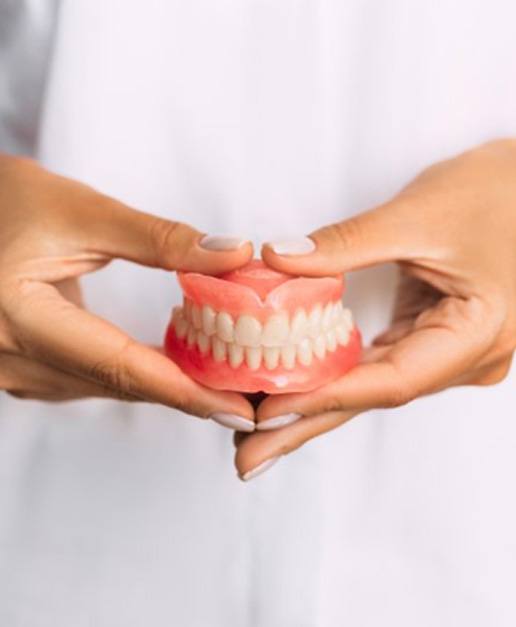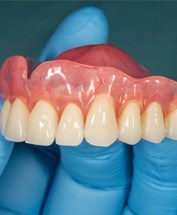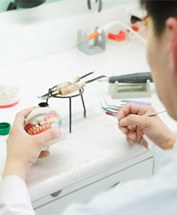Dentures – Newport, RI
Enjoy a Functional and Natural-Looking Smile Again
Going about your everyday life can be frustrating and disheartening when you’ve lost several or all of your teeth. Not only do you feel self-conscious about the gaps in your grin, but talking and eating become difficult. That’s why, at Newport Dental Associates, we offer an affordable solution that lets you enjoy a functional and natural-looking smile again – dentures. This classic tooth replacement option has existed for centuries, but the latest dental technology has made dentures in Newport, RI more lifelike than ever before. Call us today to find out how Dr. Baldelli and the rest of our team can create the perfect denture for you!
Why Choose Newport Dental Associates for Dentures?
- Serving Newport Families for 30+ Years
- Knowledgeable & Experienced Dentist
- In-Network with Several Major Dental Insurance Providers
How Dentures Are Made

Once you receive your brand-new dentures, you’ll be sure to enjoy the advantages of using your bite, speaking clearly, and smiling with confidence. But what exactly is your prosthetic made out of? How is it constructed in the first place? If these are things you’re wondering, our team is more than happy to describe the creation process for you! This way you’ll know what to expect as well as gain an even greater appreciation for your new smile.
What Are Dentures Made Of?

Dentures generally come in two parts: the base and the teeth. Here’s what each is made of:
- The Base : Of course, this is the foundation of your prosthetic which can be constructed out of different dental materials, including nylon, resin, metal, acrylic, or porcelain. In many cases, full dentures will be made from acrylic due to its ability to match exactly with the rest of your natural gum tissue. For partial dentures, you might expect them to include metal clasps within an acrylic base.
- The Teeth : Your new pearly whites will typically be made of either resin or porcelain, as both can appear as natural teeth. That said, porcelain is perhaps the more popular option due to its durability and longevity.
The Denture Creation Process

The process of creating your traditional dentures should follow these steps:
- Impressions will be taken of your upper and lower gums, which will be used to make a plaster replica of your mouth and sent to a dental lab for fabrication. There, the technicians will create a wax version of your gum line.
- Replacement teeth will then be placed in the wax with an “articulator” before minor adjustments are done to shape and carve the wax gum line to match yours. This base will be used for your final prosthetic.
- The lab will send the wax dentures to us for a fitting. If all is well, we’ll send them back for completion.
- Next, the technicians will boil the wax portions off by placing the dentures in a flask (a holding device). They’ll pour plaster within to preserve the shape of the prosthetics. The whole flask will then be placed under boiling water to melt the rest of the wax.
- Small holes will be made in the teeth so the material can bond with them. The technicians will then add a liquid separator to the plaster to keep the acrylic from getting stuck. Acrylic will be injected to replace the wax.
- Special lab tools will be used to carefully remove the plaster before placing the dentures in an ultrasonic bath to remove any residual plaster. Excess acrylic will then be cut from the prosthetic before the technicians trim and polish them for finalization.
- After completion, we’ll receive your final dentures from the lab for a fitting. Once we’ve made any necessary adjustments and confirmed that the results are correct, you’ll be free to wear your new smile.
Adjusting to Your New Dentures

It’s entirely natural to feel some mild discomfort or soreness when first wearing your dentures, as your mouth and gum line will need to get used to them. It’ll take some time to get accustomed to eating and speaking normally, but frequent practice can go a long way. Until your dentures start to feel more natural, make sure to eat softer foods that don’t require excessive chewing, exercise your facial muscles, and ask your dentist for adhesives if necessary. If you notice any problems along the way, notify our team for help.
Types of Dentures

Depending on your unique needs, oral health, preferences, and budget, you may receive one of the following types of dentures:
Partial Dentures
A partial denture fills the spaces created when some of the teeth are missing. Artificial teeth are attached to a gum-colored acrylic base that secures onto remaining teeth with metal clasps. Your partial will be customized to mimic your natural teeth and complete your smile like a lost puzzle piece.
Full Dentures
If you have an entire arch of missing teeth, a full denture can bring it all back at once. A row of prosthetic teeth rests on top of the pink base, which is designed to stay in place with natural suction against the gums. Denture adhesive can also help to stabilize your new teeth.
Dental Implant-Retained Dentures
Whether you need a full denture or a partial, your prosthetic can be secured onto dental implants. These titanium posts are surgically placed in the jaw to replace the entire structure of missing teeth in Newport. Not only do implant dentures last much longer than traditional dentures, but they also ensure your teeth won’t feel loose, slip around, or fall out.
Benefits of Dentures

As a tried-and-true solution to tooth loss, dentures come with many benefits, such as:
- A more attractive smile and a huge confidence boost
- A fuller, younger-looking facial appearance
- The ability to fill the gaps in your grin that would otherwise cause your remaining teeth to drift out of place
- An easy-to-clean restorative solution
- An affordable, non-invasive solution that does not require surgery (in the case of traditional dentures)
Denture Maintenance Tips

A fixed implant denture can essentially be cared for just like natural teeth, but removable dentures require a little more maintenance. Even though your prosthetic teeth cannot get cavities, your gums and other oral tissues are still susceptible to infection. Also, your denture won’t last as long without proper care. Here are some basic maintenance tips for traditional dentures:
- Rinse your denture with cold or lukewarm (never hot) water after each meal or snack to prevent food debris and bacteria from building up.
- If you have partial dentures, make sure to brush and floss your remaining teeth every day.
- Use a soft-bristled toothbrush and denture cleaner to gently scrub your dentures clean at least once daily.
- When you’re not wearing your dentures (such as when you’re sleeping), let them soak in a glass of water or denture cleanser to prevent them from drying out and warping their shape.
Dentures FAQs

Here at Newport Dental Associates, we understand the extensive toll that tooth loss can have on your physical and mental health! Our team aims to be as helpful and supportive as possible while we guide you through the process of rebuilding your smile. That said, you might have some questions about receiving dentures in Newport. Here are some frequently asked questions about the process to put your doubts to rest! Of course, if you have any specific inquiries regarding dentures, feel free to contact us for assistance or to schedule a consultation.
How Long Do I Have to Wait to Get Dentures After Having Teeth Pulled?
On average, patients usually have to wait about six to eight weeks before getting their dentures after having teeth extracted, though it will depend on your individual circumstances. This might seem like a long time to wait without teeth, but it’s necessary to ensure that your gums can heal properly! If you’re slated to receive implant dentures, you’ll likely have to wait about three to six months for the implants to fuse with your jawbone before the dentures can be attached.
Will It Hurt to Get Dentures?
If you need teeth extracted prior to receiving dentures, you’ll likely experience some mild soreness for a few days after your procedure. However, this can usually be managed by taking your recommended over-the-counter and prescribed pain medication as instructed. That said, once you receive dentures, it’s normal to go through an adjustment period during which your gums might feel irritated. This discomfort can sometimes take a couple of months to fully dissipate.
Is It Hard to Talk with Dentures?
When you first get your dentures, it’ll take some time for your mouth to become accustomed to speaking with them. For the first few weeks, you might talk with a lisp, a stutter, or muffle your words. However, you can speed up this adjustment process by reading out loud whenever you have the opportunity—practice makes perfect, and you will eventually get the hang of it. Also, applying a small amount of adhesive can help to stabilize your dentures and make your speech a bit clearer.
Can I Sleep with My Dentures?
Even though you can sleep while wearing your dentures, it isn’t advisable. We recommend taking your dentures out before going to bed in order to give your gum tissue and jawbone a chance to recuperate after supporting your restorations throughout the day. Removing them before bedtime also gives you the perfect chance to soak them in a glass of denture-cleaning solution or room-temperature water—if your dentures dry out, their shape might become warped! Taking them out at night also encourages healthy blood flow in your gums, which is vital for their wellness.